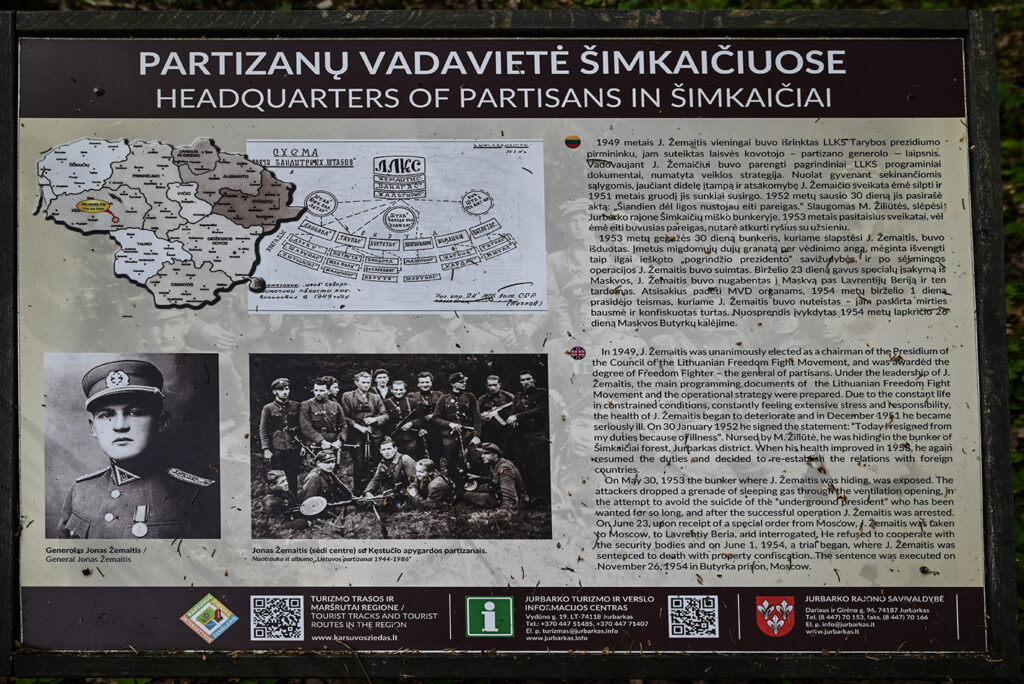Lithuania’s armed partisan resistance against the Soviet regime was not only a struggle against occupation and for independence. It was also a moral battle for a completely different worldview, based on national and religious values. A fight against injustice and for human rights.
WATCH THE VIDEO
This is a summary of some insights from Irena Vaišvilaitė, professor at the Faculty of History of Vilnius University in the Department of Theory of History and Cultural History, who we interviewed for our project dedicated to the figure of commander Jonas Žemaitis and the Lithuanian resistance.
A fight against injustice
Soviet propaganda tried to convey the idea that the partisan struggle was a sort of banditry, a civil war, which could endanger the population. Not just the regime. In reality, the majority of the population supported the partisans and helped them as much as they could. Even though the citizens themselves risked being shot or deported to the gulags.
“…For Lithuanians – says Vaišvilaitė – The resistance laid the foundations for the right to rebuild the national state, for the return of independence”.
This is confirmed by the Declaration drawn up on 16 February 1949 which affirmed the legitimacy of Lithuania to have an independent and sovereign State in its decisions.
The partisan armed resistance ended in 1953, when the obvious superiority of the Soviet Union prevailed.
That historical period, like the subsequent unarmed resistance of the Lithuanians, could serve to make Western Europe, that Europe beyond the Iron Curtain, understand that there existed, in addition to Nazism, another totalitarian regime: the Soviet/communist one.
“…This aspect can serve for a better understanding, which has not yet occurred, of that historical period by the rest of Europe. There was an authoritarianism as recognized by the Lithuanians, Latvians, Estonians, and other Central European peoples. Communism, as such, was a totalitarian ideology“.

Žemaitis and the partisan ideal
Jonas Žemaitis was the partisan leader who succeeded in bringing together the fighting groups under a single command. He was a skilled commander, historians claim, that he fought to the point of extreme sacrifice. He was killed by the Soviets in 1954 in Butyrka prison in Moscow.
“…He and his fellow resisters, the people who were killed or betrayed, already knew around 1950, 1951 that their struggle would not be crowned with victory. Yet they continued until the end to bear witness to the freedom of Lithuania for future memory”.
Under the Soviet regime, after the defeat of the partisan armed struggle, there could be no question of the resistance, but the memory of their sacrifice was alive in Lithuanian families.
“…I think I heard about Žemaitis towards the end of the 1980s, when people started talking about the partisans… Then in the 1990s, after independence, everything related to the resistance emerged”.
The in-depth study of that historical period, of the values of resistance, are still being studied, Vaišvilaitė claims.
“…The publications continue, documents and diaries are found. Now young people also know much more about resistance and this also happens more systematically. The shelters are discovered, dug underground, where the partisans hid”.
In school program it talks about resistance. Even more so in the University.
“…There is no shortage of debates and discussions. I think it is impossible to be Lithuanian, to grow up or mature in Lithuania without coming into contact with this theme, with this part of history and with the most prominent personalities who were part of it. Like Žemaitis”.
In addition to monuments and memorials, the professor claims, there is still space to talk about this topic through culture.
For example, in the field of music, or through films that do not necessarily have to be documentaries, but also feature films that talk about the biographies of those who participated in the resistance. Or those who lived through that period.
The resistance and Ukraine
The concepts underlying the Lithuanian resistance are the same ones that emerge today in the Russian war against Ukraine. The right of a Nation to its own State, to its own independence. Right to decide one’s own fate.
Then it was also an anti-imperialist struggle.
Resistance against the Soviet regime also existed in Ukraine, in the Western part. And, says Irena, there were contacts between the partisans of both sides. Although unstructured.
Some Ukrainians arrived in Vilnius in January 1991 to defend the Lithuanian Parliament under Soviet siege.
“…The same anti-imperialist ethic resurfaced in Ukraine during the Maidan protests. And today we are once again dealing with imperial claims on the part of Russia. Ukraine is fighting against this”.
Žemaitis project
The interview is part of the project “Jonas Žemaitis, commander of fighting Lithuania”, created by the “Baltika-Baltijos Istorijos” Association and LithuanianStories to remember the figure of the commander, with the precious support of Kotryna Buono and Ana Luisa Monse, Žemaitis’ great-grandchildren.
The initiative is partially financed by the Ministry of Defense of the Republic of Lithuania.
The project involves a series of video interviews with figures from civil society in today Lithuania: historians, representatives of institutions, ordinary citizens, people who are interested in and pass on the memory of the partisan resistance against the Soviet occupation.
WATCH THE VIDEO

